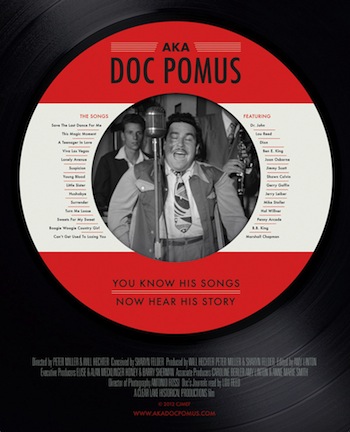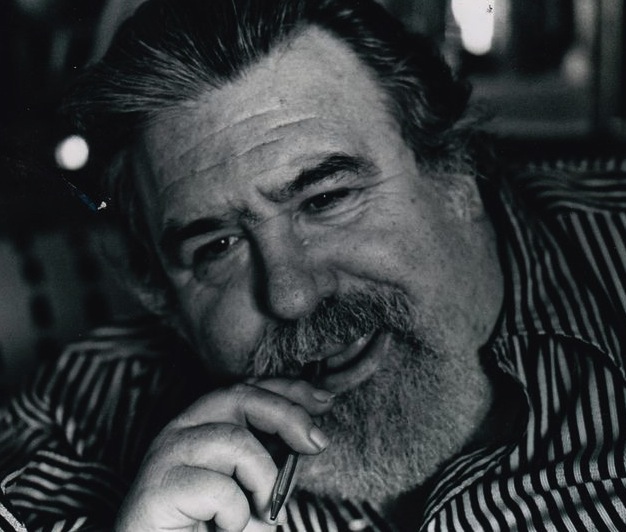Film Interview: Director Peter Miller on the Making of “AKA Doc Pomus,” The Story of a Master Songwriter
Despite the influence and the respect Doc Pomus still has in the music community, his name is not as well known to the public as that of some of his contemporaries. Thus the film revives an important legacy.
An interview with Peter Miller, one of the directors of the film AKA Doc Pomus. The film screens at The Regent Theatre, Arlington, MA, on December 12 at 7:30 p.m.
by Tim Jackson
AKA Doc Pomus, a new film about the legendary songwriter who wrote some of the greatest hit songs of the last half-century, is an important addition to the recent spate of films about contemporary pop music history. The latter include Standing in the Shadows of Motown, 20 Feet From Stardom, Muscle Shoals, and Sound City. Doc Pomus’s songs, many co-written with Mort Schuman, include “Lonely Avenue,” (Ray Charles) “Youngblood” (Coasters), “Teenager in Love” (Dion), “Save the Last Dance for Me” (Drifters), “This Magic Moment” (Ben E. King), “Little Sister” and “Viva Las Vegas” (Elvis).
Born Jerome Felder, this intelligent, outgoing, and athletic Jewish boy from Long Island developed an early and deep love for jazz and blues music. He contracted polio as a child, yet despite this handicap he dragged himself to clubs and soaked in the material, eventually finding himself on stage impressing audiences with his beautiful singing voice. More impressive was his gift for songwriting: he became one of the mainstays of the famous Brill Building in New York, which housed some of the greatest songwriters of the ’50s and ’60s including Carol King, Jerry Goffin, Lieber and Stoller, Phil Spector, Neil Diamond, Bacharach and David, and others. His largess and talent made him a mentor to these writers.
The film chronicles the effect that bands such as the Beatles, who wrote their own material, had on this craft. Unlike artists such as Carol King, Pomus, because of his handicap, had a difficult time parlaying his songwriting into a second career. For 10 years he survived as a gambler, but with the death of Elvis Presley came a return of royalties. He went on to revive his career, becoming an advisor and collaborator with a new generation of songwriters. Despite the influence and the respect Doc Pomus still has in the music community, his name is not as well known to the public as that of some of his contemporaries. Thus the film revives an important legacy by artfully showing how this man’s life and his powerful music were intertwined. Along with concert footage and lots of music, there are interviews with Lou Reed, B.B. King, Gerry Goffin, Jimmy Scott, Ben. E. King, Dr. John, Dion, and others, as well as talks with the colorful members of Pomus’s own New York family.
In the film, singer songwriter Marshal Chapman says it well: “I’ve never met anybody so fuckin’ cool and so big hearted at the same time. Doc had it all. He was like a perfect universe of ying and yang, love and cool, in one body that had to be big to contain it.”
Director Peter Miller (along with Will Hechter) found himself with the enviable task of telling this vibrant story. I asked the director how he gained access to such a treasure trove of archival material.
Peter Miller: I kept pinching myself during the making of the movie, telling myself ‘I can’t believe I get to tell the story.’ Coming into the project I didn’t know that much about him. I love music [Miller worked on source music for Ken Burns’ Jazz series] and I’d seen his name on a lot of records over the years. I read Peter Guralnick’s biography on Elvis and Doc shows up in it a lot. I also made a film called Jews and Baseball, produced by William Hechter. When we finished, he said let’s make a film about the Brill Building next. And I said let’s look and see if there’s a person’s story that is really worth telling. And that turned out to be Doc Pomus. And after reading Alex Halberstadt’s biography, I realized this was a story that was unbelievable. So we called up Doc’s family and contacted Sharyn Felder, Doc’s daughter, who told us she’d been trying to make just such a documentary for years
Even though she was not a filmmaker, she knew that there was footage she needed to get together while her father was still alive. She had been trying to tell the story and couldn’t get it finished, or even get it off the ground very far. Sharyn had been taking care of her father’s legacy, making sure his story would be remembered. He knew everybody in the business, and she had been collecting pictures and other material over the years, and was in touch with major players. So we got access to all sorts of people and archival material.
Arts Fuse: Not only do you have a number of great interviews with Doc Pomus, but got access to journals where he expresses some very private thoughts.
PM: Some of the interview footage that you see is what his daughter shot a decade ago. Pomus died in 1991, so we couldn’t interview him, but a lot of people did interview him and so he’s able to tell his story. When the cameras are on, he is quite affable. We realized that there was another side to his personality that needed to have come through in the film, a kind of an internal monologue about what he’s thinking. We wanted to let Doc tell his own story and tell us what he was thinking. We found his journals, which he kept in composition books, where he scribbled lots of stuff. Sometimes it was a shopping list or baseball scores. But these volumes also contain private observations. The passages chosen from the journals are narrated in the film by Lou Reed.
AF: The interview subjects are remarkably eloquent and often very moving. There seems to be nobody who didn’t love this man, and thinking of him brings tears to their eyes all these years later. Even his first wife, despite the difficulties they may have had, gets very emotional talking about how his life informed his work.
PM: What struck me interviewing these folks is that every interview was good, and every one seemed to get better than the next. I did maybe 30 interviews for this film and nobody ended up on the cutting floor. Everybody we met was so articulate – soulful, funny, and passionate. The conclusion I came to about Pomus after all these interviews, including with his ex-wives and his girlfriends, is that Doc surrounded himself with incredibly interesting, articulate, and deep-souled people. He was a guy who couldn’t get around, so he did whatever he could to create a community. Because of who he was and because of his physical limitations he depended on conversation. So the people who were in his life were really interesting people to talk to.
AF: The film finds a nice balance between history, music, and understanding who Doc Pomus was as a person, between understanding the challenges of his life and the difficulties of the songwriting craft.
PM: My main collaborator now for many years is my editor, Amy Linton (Daughters of the Dust) who was responsible for the film’s tone. It’s our fourth film together. We had a lot of fun figuring out how to combine story and music effectively. His life and art are inseparable in many ways. His story would’ve been interesting no matter what, but the music is inseparable from who he is, and his life is inseparable from the songs. Doc Pomus would’ve said he’s a craftsman, a songwriter who just wants to write songs, but a lot of what he is writing seems to be about his life. Or you could say that the songs are a way in which he told the story of his life. He’s not an autobiographical singer-songwriter – he wrote 1000 songs – but when you’re listening to some of the lyrics you can’t help but think ‘Oh my God, this is about what he’s going through.’
Tim Jackson is an assistant professor at the New England Institute of Art in the Digital Film and Video Department. His music career in Boston began in the 1970s and includes some 20 groups, many recordings, national and international tours, and contributions to film soundtracks. He studied theater and English as an undergraduate and has also has worked helter skelter as an actor and member of SAG and AFTRA since the 1980s. He has directed two documentaries: Chaos and Order: Making American Theater about the American Repertory Theater, and Radical Jesters, which profiles the practices of 11 interventionist artists and agit-prop performance groups. He is currently finishing a third documentary, When Things Go Wrong, about the Boston singer/songwriter Robin Lane, with whom he has worked for 30 years. You can read more of his work on his blog.



Great article and interview Tim.